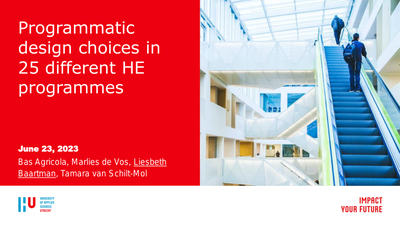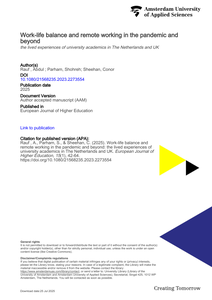Assessment in higher education (HE) is often focused on concluding modules with one or more tests that students need to pass. As a result, both students and teachers are primarily concerned with the summative function of assessment: information from tests is used to make pass/fail decisions about students. In recent years, increasing attention has been paid to the formative function of assessment and focus has shifted towards how assessment can stimulate learning. However, this also leads to a search for balance between both functions of assessment. Programmatic assessment (PA) is an assessment concept in which their intertwining is embraced to strike a new balance. A growing number of higher education programmes has implemented PA. Although there is consensus about the theoretical principles that form the basis for the design of PA, programmes make various specific design choices based on these principles, fitting with their own context. This paper provides insight into the design choices that programmes make when implementing PA and into the considerations that play a role in making these design choices. Such an overview is important for research purposes because it creates a framework for investigating the effects of different design choices within PA.
DOCUMENT

"Purpose – Little is known about effective supervision of offenders with debt. This multiple case study aims to gain insight into working elements in offender supervision on debt. This is important for probation officers to choose the most effective interventions in daily offender supervision. Design/methodology/approach – This study included five best practice cases based on both interviews with involved professionals and clients and client file information. One case was described in detail to illustrate what probation officers and clients encounter when working on debt. All five cases were analyzed thematically using patternmatching techniques and crosscase syntheses on debt background, current supervision, barriers and working elements. Findings – Organization processes and lack of aftercare hinder effective supervision. Close collaboration with other professionals (e.g. debt counselors) is important in supervising clients with debt. The client’s own behavior and motivation for supervision are crucial in the success of debt supervision and can be both hindering and effective. Working elements in supervision depend on personal characteristics of professionals involved and on the extent to which elements of a working alliance, particularly trust and bonding, are built. Practical implications – Support and facilitation from probation organizations regarding primary conditions and collaboration, training professionals in methods of stimulating clients motivation and an effective working alliance are essential to supervise clients with debt adequately. Originality/value – To the best of the authors’ knowledge, no other in-depth study has yet been conducted on working elements in supervision of probationers with debt."
DOCUMENT
Poor work-life balance (WLB) has been linked to negative outcomes such as increased stress, anxiety, depression, and a perceived reduction in the overall quality of life. At an institutional level, these may include lowered employee commitment and decreased productivity at work. The advent of COVID-19 has necessitated fundamental alterations to work experience and the ways in which WLB may be perceived. This phenomenological study employed qualitative, in-depth interviews to explore higher education academics’ lived experiences of remote working and how they perceived this had impacted their well-being (WB) and WLB. Using purposive samplings, respondents were drawn from HE sectors in the Netherlands, and the UK. The findings offered an understanding of how remote and hybrid teaching delivery during the pandemic affected academics’ actual experiences of WB and WLB. These findings serve to enhance policymakers’ understandings of significant occupational health and WB issues within a post-pandemic education service paradigm.
DOCUMENT

Empathy tasks, which invite students to identify with historical actors or describe their perspectives, are a common phenomenon in history education. The aim of this study is to explore the differences in students’ answers when completing an empathy task asking for an account written in first person (“imagine you are in the past”) or in third person (“imagine someone in the past”), or a task in which no empathy at all is asked. Students in Dutch secondary education (N = 254) participated by completing a task on the Dutch Iconoclasm. Our analysis of student answers focused on aspects of historical empathy: historical contextualization, affective elements and perspective taking.We found that both empathy tasks stimulated students to include concrete details and emotions of historical actors. The texts of students who were not asked to empathize included more multiple perspectives. Students who completed the empathy task in first person, showed more presentism and moral judgements of the past than students who completed a task in third person.
LINK
Een reclasseringswerker heeft te maken met een bont gezelschap mensen dat met politie en justitie in aanraking is gekomen. Het gaat om mensen die verdacht of veroordeeld zijn voor een strafbaar feit. Delicten die gaan van winkeldiefstal tot moord en van huiselijk geweld tot een gewelddadige overval. De reclassering pendelt tussen advies, hulp en controle op straffen. De afgelopen decennia volgen diverse ontwikkelingen in het reclasseringswerk elkaar in hoog tempo op. Van een ‘zachte’ procesmatige benadering naar productgericht en methodisch werken en meer aandacht voor recidivevermindering. Op dit moment maakt sturing van bovenaf plaats voor meer eigen verantwoordelijkheid. De focus ligt op ‘betekenisvol reclasseren’ met de ene keer het accent meer op hulp, de andere keer meer op controle. In Hé reclassering is het allemaal te lezen.
MULTIFILE
1e alinea column: Je staat op een borrel en iemand komt naar je toe terwijl die al duidelijk aan het lonken is naar een ander. Hallo zeggen, met de blik naar de volgende. Irritant he? Herken je het?
LINK
In het boek Schools that learn (2012, p. 76) van Peter Senge staat een mooi citaat: ‘A boy of five, on the first day of kindergarten, asked his teacher, ‘When am I going to learn how to read? She said, a bit absently (for there was a lot going on), ‘Oh, that won’t happen until next year, in first grade.’ He didn’t say anything, but an hour or so later, she noticed that he had slipped away when no one was looking. He walked out of the room and continued home (which fortunately was only a few blocks away). He went up to his startled mother and said, ‘ I’ll go back next year…when they’re ready to teach me to read.’ Deze vijfjarige leerling heeft duidelijk niet de leeromgeving waar hij behoefte aan heeft. Hij wil graag leren lezen maar ‘de school is daar nog niet klaar voor’. Het aansluiten bij de leerbehoeften van de lerende is binnen alle onderwijstypes en op alle onderwijsniveaus van belang. Een leeromgeving zou altijd een krachtige leeromgeving moeten zijn. Zelfsturing is één van de kenmerken daarvan. In dit artikel wordt ingegaan op een krachtige leeromgeving voor gezondheidsprofessionals in opleiding van de Faculteit voor Gezondheid, Voeding & Sport van De Haagse Hogeschool. Op basis van literatuur wordt beschreven aan welke criteria een dergelijke leeromgeving moet voldoen. Vervolgens worden resultaten beschreven van een onderzoek onder studenten en docenten van de Faculteit voor Gezondheid, Voeding & Sport van De Haagse Hogeschool. Doel van dit onderzoek was om in kaart te brengen hoe studenten en docenten praktijkgericht, zelfgestuurd en interdisciplinair leren ervaren, wat deze manier van leren precies van student en docent vraagt en wat dit oplevert met betrekking tot competentie-ontwikkeling van studenten. De volgende vragen stonden centraal: • Hoe ervaren studenten en docenten dergelijke leeractiviteiten? • Wat vraagt een krachtige leeromgeving van de student en docent? • Wat levert de krachtige leeromgeving volgens hen op?
DOCUMENT

One of the claims the OER movement makes is that availability of (open) digital learning materials improves the quality of education. The promise is the ability to offer educational programs that take into account specific demands of the learner. The question is how to reach a situation where a customized demand can be met using OER with acceptable quality against acceptable costs. This situation resembles mass customization as is common in industry for several decades now. Techniques from an industry where an end product is assembled with the demands of the customer as a starting point can be translated to the field of education where courses and learning paths through a curriculum are assembled using a mixture of open and closed learning materials and learning services offered by an institution. Advanced IT support for both the modeling of the learning materials and services and a configurator to be used by a learner are necessary conditions for this approach.
MULTIFILE

Snel nadat duidelijk werd dat Barack Obama de Amerikaanse presidentsverkiezingen gewonnen had, hield hij in Chicago zijn overwinningstoespraak. Was dit de historische toespraak waar Amerika op zat te wachten? Hoe goed was de speech eigenlijk? Ik zal hier een korte analyse presenteren van Obama's victory speech om aan te tonen dat deze retorisch goed in elkaar steekt.
DOCUMENT

A social media architect is an appealing new profession that entails crossovers between communication and IT & Design. There are no study programmes for this job. Important questions are how to interest secondary school pupils for such a new job, and how to prepare them for these jobs or jobs that do not even exist today? This research aims to set an example by presenting a realistic job profile of a social media architect by linking the ‘21st century skills’ to the context in which he/she operates.
DOCUMENT
